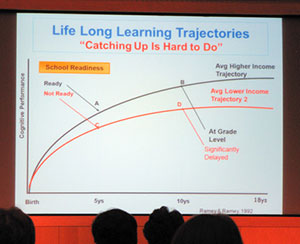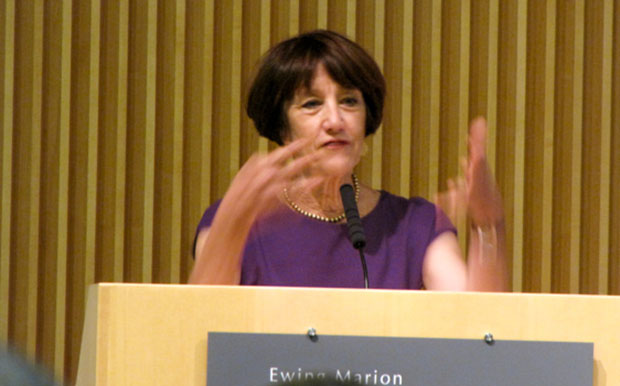By Joe Lambe
Early childhood education has finally become a national movement and citizens should help make it happen here, experts said Monday.
It starts simple and costs little.
“Talk, Read, Play” with your child every day,” is the message they want carried citywide.
Federal and city officials, social service providers, policy makers and others were among those who met in Kansas City for what was called a conference and community conversation.
Mayor Sly James, who in 2011 started his Turn the Page KC reading program, spoke of the enemy – a 30-million-word gap between those heard by richer and poor pre-school children.
“We can overcome this void of words if we work together,” he said. “We know what needs to be done….”
 Children with more affluent professional parents by age 4 hear about that many more words on average than low-income children.
Children with more affluent professional parents by age 4 hear about that many more words on average than low-income children.
By age three, the vocabulary of the lower income children averages 500 words or less compared to 1,100 words for the high income children, said Judith J. Carta, director of early childhood research at Juniper Gardens Children’s Project at the University of Kansas.
That translates to disadvantages at school and in life, and politicians and others understand that now, she said.
“Finally people are getting it,” Carta said. “Essentially what we have is a growing movement.”
After three decades in the field, she said, “I think this is one of the most exciting times in early childhood learning I have ever experienced.”
Libby Doggett, a deputy assistant secretary in the U.S. Department of Education, said a recent poll showed 71 percent of people support more spending for early childhood education.
Rival politicians are fighting over which of them most supports it, she said, and political advisors are telling clients to take strong stands for it, especially if they run against women.
In state governments, many red states are leaders in attacking the problem, but Missouri is way down the list on expenditures and effort.
“You’re at a position where you’re behind and you need to catch up,” Doggett said.
But forget the state, she said. “Cities can’t wait for the federal government, we can’t wait for the states – we’ve got to keep pushing.”
So the call goes to everyone in the community.
“Schools can’t do this alone – we’ve got to pull in our partners,” she said.
Changes will come too slow as it is, Doggett said.
“This is a 10, 20-year campaign to figure out how we can do better …,” she said, and experts are watching things like the mayor’s reading program and the “Talk, Read, Play” effort.
Meanwhile, poor children grow older.
“Children who are poor readers by the end of first grade almost never achieve average reading by the end of elementary school,” Carta said.




Who’s talking